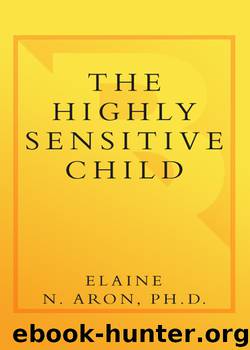The Highly Sensitive Child by Elaine N. Aron

Author:Elaine N. Aron
Language: eng
Format: epub
ISBN: 9780767913904
Publisher: Broadway Books
Published: 2002-10-08T04:00:00+00:00
Don't Be a Parent Who Overstimulates
Sometimes it is easy for parents to realize they are overstimulating their infant with things to see, but do not notice when they themselves are the source of stimulation. But especially at this age, when your child is sitting up and being so adorably responsive, you may be doing it unintentionally. Daniel Stern, a specialist in the infant-mother bond, based on his years of infant observation and research, is well aware of the potential for the overstimulation of infants. He describes a baby whose mother was constantly “in his face,” trying to play games such as peekaboo that anyone except the mother could see were overexciting and distressing her son. The baby learned to cope by avoiding eye contact or even looking toward her face. He turned or hung his head and closed his eyes. Later, when he could walk, he just left the room. But unfortunately, such early lessons become quickly generalized: Stern reports that later this infant became “avoidant,” choosing to avoid most forms of intimacy with most people. Stern also described another baby of this age who, instead of avoiding her mother's overstimulation, became overly compliant. She would gaze into space and accept whatever was done to her—a different type of reaction that a sensitive infant might have to constant overstimulation.
Stern suggests that a parent might be overstimulating for many reasons: “hostility, need for control, insensitivity, or an unusual sensitivity to rejection [by the infant].” I would add that simple ignorance of an infant's sensitivity might also be the cause, especially if you have raised other children who liked or needed more stimulation.
You can easily avoid overstimulating your baby now that you know the typical signs of distress—crying, turning the head, looking down, closing the eyes tight, staring into space, or any other expression of misery. Think of your baby as a sensitive individual who needs to balance her need for some space around her with her need to feel secure through being close to others. She has to learn to shift from meeting one need to meeting the other, and you can help by matching her shifts.
Keep in mind that you do not want to overprotect either. Sensitive infants should not be swathed in cotton and kept in a sensory bubble. There is some evidence that exposing infants to a little stress may reduce their reactions to further mild stressors. The only exceptions are infants who are already highly stressed. So the key to developing resiliency is to offer the right amount of stimulation and challenge. Again, knowing the right amount requires your being responsive, alert to what your child can take in and find useful. There might be some discomfort for a moment, but it should be followed by your infant enjoying the experience and being calmer next time.
Download
This site does not store any files on its server. We only index and link to content provided by other sites. Please contact the content providers to delete copyright contents if any and email us, we'll remove relevant links or contents immediately.
The Lost Art of Listening by Michael P. Nichols(7506)
Rich Dad Poor Dad by Robert T. Kiyosaki(6633)
We Need to Talk by Celeste Headlee(5615)
I Love You But I Don't Trust You by Mira Kirshenbaum(3876)
The Complete Idiot's Guide to Coping With Difficult People by Arlene Uhl(3149)
Rich Dad Poor Dad: What The Rich Teach Their Kids About Money - That The Poor And Middle Class Do Not! by Robert T. Kiyosaki(2958)
A Burst of Light by Audre Lorde(2607)
The Book You Wish Your Parents Had Read (and Your Children Will Be Glad That You Did) by Philippa Perry(2528)
Dealing with People You Can't Stand by Dr. Rick Brinkman(2460)
Life Hacks by Dan Marshall(2456)
An Odyssey by Daniel Mendelsohn(2309)
The Expectant Father by Armin A. Brott & Jennifer Ash(2273)
Teach Your Child How to Think by Edward De Bono(2159)
No Time to Say Goodbye(2118)
What I Need by J. Daniels(2082)
The 7 Habits Of Highly Effective Teens by Covey Sean(2080)
The Out-of-Sync Child by Carol Stock Kranowitz(2055)
The Anxious Generation by Jonathan Haidt(2051)
I Don't Belong to You by Keke Palmer(2005)
